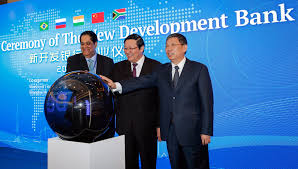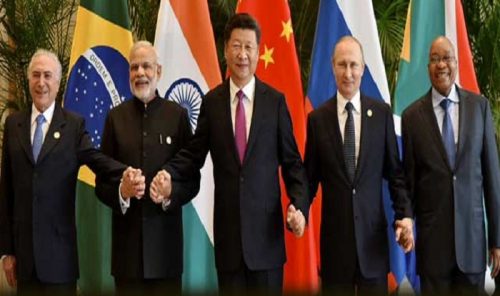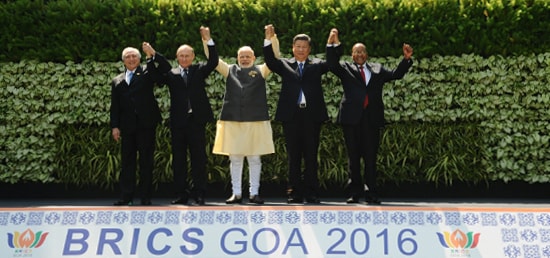
India’s presidency of the BRICS grouping of emerging powers has come to an end after a packed year of more than a hundred events, meetings, and conventions. The highlight was the meeting of the Heads of States organised in Goa on 15-16 October where all the leaders of BRICS countries were in attendance.
The summit itself elicited a tepid response. However, as some commentators observed, India’s skewed focus on terrorism and its efforts to insert words such as cross border terrorism (presumably directed at Pakistan) in the final declaration derailed the conversation at the forum, which is known to keep thorny bilateral issues off the table. It was also overshadowed by the more productive annual Russia-India summit, where the two countries signed sixteen agreements in sectors ranging from defence, trade and investment, energy and infrastructure, and smart cities.
Even so, it is imperative to analyse the outcomes of the multiple processes on themes such as labour, education, health, trade, agriculture, and environment to gauge the progresses made by the forum over the past year.
Health

At the BRICS health ministers meeting, the member nations discussed the need for closer cooperation in fighting and reducing the incidence of Tuberculosis (TB), HIV and malaria by creating a research and development consortium. They also agreed on setting up a network specifically on TB research. The ministers adopted the BRICS Action Plan on Traditional/Alternative Systems of Medicine which mandates them to promote collaboration and research in traditional medicine, as well as to evolve consensus on regulations of traditional medicines. Significantly, it underscores the protection of traditional knowledge and traditional cultural expressions at international forums.
Trade
The BRICS countries have often been criticised for not making enough progress on trade; intra-BRICS trade is currently less than five per cent of the total trade of its members. While a proposal floated by China to establish a BRICS free trade agreement (FTA) was met with little enthusiasm, the countries did agree to form a Customs Cooperation Committee, which will function as a permanent body for ensuring coordination on customs policy including technical and administrative assistance, and trade facilitation.
The BRICS have also decided to constitute a task force to explore the possibility of an international trade dispute resolution mechanism among them. This is noteworthy given that the BRICS countries have not had too many positive experiences at existing arbitrations institutes. Moreover, if this mechanism is later extended to non-BRICS nations as is currently being suggested, it would not only be extremely important for other developing countries, which are currently hugely underrepresented in international arbitration, but also contribute to consolidating the larger rule-setting role that the BRICS want to chart out for themselves.
Education
The BRICS finalised modalities of the BRICS Network University (BRICSNU) and the BRICS University League (BRICSUL), both of which are slated to commence their programmes in 2017. It is expected that these initiatives will facilitate collaboration in higher education, research and innovation. Additionally, efforts to establish a BRICS Sports Council to foster more youth engagement and exchanges amongst the BRICS countries have been initiated.
Labour and Employment
Under India’s chairmanship, labour and employment have emerged as key focus areas with a series of high level meetings highlighting the need for decent work, formalisation of labour markets, and social protection. Against this backdrop, the Labour and Employment Ministers’ Declaration resolved to establish a network of lead labour research and training institutions to undertake joint research and training activities, and build capacities of various stakeholders. They also decided to pursue bilateral social security arrangements, which could make labour migration amongst the member countries easier.
Agriculture
The governments of BRICS countries signed a Memorandum of Understanding (MoU) for the establishment of a BRICS Agriculture Research Platform (BRICS-ARP).
The research centre aims to facilitate knowledge exchange and capacity building through joint projects, strengthen agricultural research and education through existing networks and institutions, accelerate technology development and transfer, and provide policy inputs on issues of agricultural marketing and distribution, harmonisation of agricultural related standards, promotion of agricultural trade, and bio-security, risks and disaster management in agriculture.
Environment and Climate
The environment ministers of BRICS countries set up a joint working group to focus on four broad areas, namely abatement and control of air and water pollution, efficient waste management, climate change, and conservation of biodiversity. It has also been decided to set up a platform in the near future for sharing environmentally sound technologies and promoting innovations, along with a common website which would allow the pooling of knowledge resources and a network of technical institutions to undertake joint projects.
The BRICS countries are also grappling with increasingly complex challenges when it comes to disaster risk reduction, post-disaster reconstruction and rehabilitation, and the impact of climate change on the frequency and severity of disasters. At the meeting of the BRICS Ministers for Disaster Management therefore, the governments adopted the Udaipur Declaration which calls for regular dialogue, exchange, mutual support, and collaboration in tackling disasters. They also decided to set up a joint task force on disaster management and finalised the roadmap for implementation of a Joint Action Plan, which includes setting up a coordination and networking arrangement amongst the apex institutions of BRICS which deal with disaster management, and conducting a feasibility study on annual allocations from New Development Bank (NDB) towards risk mitigation projects.
Development Finance
 The New Development Bank made significant advances last year by approving its first set of loans to the tune of $811 million for renewable energy projects, with $300 million allocated to Brazil, $81 million to China, $250 million to India, and $180 million to South Africa. The bank also raised close to $449 million in Yuan denominated green bonds in China, and has expressed its intention to sell similar bonds in the Russian and Indian markets to enable funding in local currencies.
The New Development Bank made significant advances last year by approving its first set of loans to the tune of $811 million for renewable energy projects, with $300 million allocated to Brazil, $81 million to China, $250 million to India, and $180 million to South Africa. The bank also raised close to $449 million in Yuan denominated green bonds in China, and has expressed its intention to sell similar bonds in the Russian and Indian markets to enable funding in local currencies.
The BRICS Contingent Reserve Arrangement (CRA) was also declared to be operational and it was proposed that a network of all central banks’ research units be established to support the working of the CRA.
The BRICS governments continued their deliberations on a BRICS rating agency and have now constituted a working group on exploring the feasibility of establishing Alternate Rating Agencies for Emerging Markets.
Railways
As a follow up to India’s Prime Minister Narendra Modi’s proposal at the Ufa summit in 2015, the BRICS railway ministers discussed the scope for setting up a BRICS Railways Research Network (BRRN) to promote research and development in the sector. A committee has also been formed to explore areas of technical cooperation and overlook the process.
BRICS-BIMSTEC outreach
The BRICS-BIMSTEC (Bay of Bengal Initiative for Multi-Sectoral Technical and Economic Cooperation) outreach summit also yielded positive results. Not only did the BIMSTEC countries adopt a line closer to India’s on the question of terrorism by calling for strong measures against states that support and sponsor terror groups (again, ostensibly targeted at Pakistan), they also resolved to cooperate on developing the region’s blue economy, improving connectivity, and expediting the process for a BIMSTEC free trade agreement.
The Way Ahead
International developments in the past couple of years have squarely put the spotlight on the constituent countries of the BRICS forum. Russia’s expanding role in Syria, China’s One belt One Road initiative, which will have massive economic and political implications for Eurasia, South and South East Asia and Africa, and the centrality of India’s and China’s emission pathways to the success of the international climate agreement have accorded these countries a central role in some of the major global challenges of our times.

But the BRICS forum itself has faced questions of continuity for some time now, and the considerable slowing down of their economies, increasing antagonism and strategic clashes between China and India, as well as the pre-eminence of the growing Russia-China partnership have further reinforced these doubts.
Seen in this context, the BRICS governments’ push to further institutionalise and consolidate their progress is an indication of the importance they still attach to the forum, and a decade since coming together, they seem poised to expand beyond being an economic grouping demanding a seat at the high table to substantial cooperation in other sectors. Within last year, BRICS countries greatly diversified their cooperation through working groups on counter terrorism, employment, environment, agriculture, health, economy and trade, education and vocational training, anti-corruption, infrastructure, information and communication technologies (ICTs), and energy.
At this juncture, it would serve the BRICS governments well to ensure truly democratic and inclusive institutions which pave the way for opening up global governance in favour of developing countries. They need to realise that the relevance of the grouping is closely tied to concomitant development and greater voice for their immediate neighbours and the larger global South.
The BRICS governments should start by addressing the following issues:
- Greater transparency in the functioning of NDB: The BRICS bank was formed to provide developing countries with an alternate source of development finance. The bank has already started its lending function without putting adequate safeguards and mechanisms such as an independent oversight and grievance redressal policy in place. Moreover, there is a lack of transparency and public consultations which has been a cause of considerable concern for civil society. In order to become a credible international institution, the bank needs to not only move away from debilitating conditionalities of liberalisation, deregulation and privatisation, but also adopt strict and transparent socio-environmental safeguards.
- Implications of mega free trade agreements such as RCEP: Leaked drafts of the Regional Comprehensive Economic Partnership (RCEP), which are currently being negotiated by sixteen countries including India and China, reveal that developed countries are pushing for WTO+ rules on issues such as Intellectual Property Rights (IPR). These could have far-reaching consequences for supply and access to generic medicines, and farmer’s rights to save, exchange, or modify traditional seeds. In fact, with trade negotiations at WTO in a logjam, such plurilateral trade arrangements are gaining more and more traction. At a time when many of the BRICS countries have assumed leadership roles in pursuing regional and sub-regional trade treaties, it is important for them to develop a comprehensive strategy which protects the interests of the most marginalised and vulnerable populations in developing countries.
- Access to clean technology: The BRICS countries have a major role to play in investing in easily replicable, low-cost green technologies which can help them meet or go beyond their current emission targets. They also need to provide financial and technical support to smaller developing countries to enable them to make the transition to cleaner economies faster. The BRICS governments should prioritise this aspect in their joint research undertakings and through the NDB in the coming years.
- Agriculture and trade at the WTO: After the last WTO ministerial in Nairobi, the Doha development round was pronounced all but dead as developing countries conceded ground on the single undertaking character of the agenda and opened the door for discussions on new issues such as environment, labour, investments, e-commerce, and government procurement. Moreover, they agreed to the trade facilitation agreement (TFA) without any reciprocal movement on their key demands related to food security and agriculture. China, India and other developing countries should now rally together and attempt to preserve the single undertaking while pushing for a permanent solution for public food stockholding and the special safeguard mechanism (SSM).

- Role in shaping the international security architecture: The BRICS countries are convinced that international institutions entrusted with ensuring peace and security are failing in fulfilling their responsibilities as they are antiquated in their composition and objectives. Instead, the BRICS have envisaged a broader role for themselves in mediating international conflicts, contributing to peace-building efforts, and maintaining global peace and stability. But despite their increasing engagement on contemporary crises such as Libya and Syria, so far they have made what can only be described as feeble attempts at a normative re-imagination of international security concepts such as the responsibility to protect. The BRICS countries should work towards evolving more innovative and democratic approaches to conflict resolution which give primacy to negotiated political solutions and protection of human rights.
References:
- All official BRICS documents accessed at: http://brics2016.gov.in/content/document.php
- Raghavan, Chakravarthi, News of Doha’s Death May be Premature but India, China Must Fight to Save the Day, The Wire https://thewire.in/17950/news-of-dohas-death-may-be-premature-but-india-china-must-fight-to-save-the-day/
- Abdenur, Adriana Erthal, Rising Powers and International Security: the BRICS and the Syrian Conflict, Rising Powers Quarterly http://risingpowersproject.com/quarterly/rising-powers-and-international-security-the-brics-and-the-syrian-conflict/
Author Profile
- India Writes Network (www.indiawrites.org) is an emerging think tank and a media-publishing company focused on international affairs & the India Story. Centre for Global India Insights is the research arm of India Writes Network. To subscribe to India and the World, write to editor@indiawrites.org. A venture of TGII Media Private Limited, a leading media, publishing and consultancy company, IWN has carved a niche for balanced and exhaustive reporting and analysis of international affairs. Eminent personalities, politicians, diplomats, authors, strategy gurus and news-makers have contributed to India Writes Network, as also “India and the World,” a magazine focused on global affairs.
Latest entries
 DiplomacyApril 23, 2024Resetting West Asia, re-booting the world, but not fast enough: T.S. Tirumurti
DiplomacyApril 23, 2024Resetting West Asia, re-booting the world, but not fast enough: T.S. Tirumurti India and the WorldApril 22, 2024India’s G20 Legacy: Mainstreaming Africa, Global South in global agenda
India and the WorldApril 22, 2024India’s G20 Legacy: Mainstreaming Africa, Global South in global agenda DiplomacyApril 10, 2024Diplomat-author Lakshmi Puri pitches for women power at LSR
DiplomacyApril 10, 2024Diplomat-author Lakshmi Puri pitches for women power at LSR India and the WorldApril 6, 2024UN envoy pitches to take India’s solutions to the world stage
India and the WorldApril 6, 2024UN envoy pitches to take India’s solutions to the world stage








